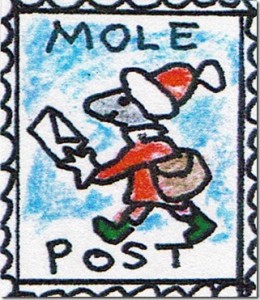Rain! Glorious rain. Umbrellas up, gumboots on, thunder rolling, the garden looking sprightly for the first time this year. Long soaking rain overnight. A little respite in our droughty summer, or a glimmer even of the autumn to come?
It is the kind of rain that descended on the woods and fields and rivers around Great Uncle Mole’s burrow for weeks on end. It is the kind of rain that sent us scurrying off to pick blackberries, and it is the kind of rain I associate with mushrooming. The blackberrying might happen on the spur of the moment – a wet afternoon, the blackberries ripe. The reward for the scratches and the thorns in our paws would be Great Great Grandmother’s Special Crumble, a recipe handed down from molemother to moleson, and baked by Great Uncle Mole in the welcoming fug of the kitchen.
Mushrooming, on the other hand, was a rather more organised affair – not the meticulous, rule-following kind of organisation that Great Uncle Mole went in for (which is awfully useful when you are building a tunnel) but the planting of germs of anticipation that Uncle Ratty was rather a dab paw at. He’d lay the foundations with the brewing up of his personal stock. He never revealed the ingredients, but a day or two before our outings he would send me off on multiple foraging expeditions so that in a sort of pelmanistic way I now feel I could make a reasonable pawfist of reproducing it. Besides it was generic rather than exact – Uncle Ratty was incapable of creating the same thing twice. He would also spend hours in the cellar, emerging cobweb-coated and smug with a very particular kind of wine. Alas, I cannot remember what it was.
For weeks beforehand the two chums would go on long walks together, Uncle Ratty leading with his intuition and Great Uncle Mole trying to keep up with maps and the policeman’s notebook he kept to jot things down. In the evenings they’d pore over the maps, discussing copses and rotting logs, mossy banks and hedgerows. By mushroom day I’d barely be able to contain myself with the anticipation. Great Uncle Mole and I were the basket carriers. Uncle Ratty nosed them out, plucked them, twirled them in his paws, and named them. Oh, the names: Glistening Inkcaps, Big Ears, Scarlet Hoods, Powdery Brittlegill, Trooping Funnels, Hedgehogs, Slippery Jacks, Horns of Plenty, Judges’ Wigs. And the colours: purple and yellow and red, although it was often the brown ones like Wood Mushrooms, the Oak Boletes and Chanterelles that tasted best.
A couple of weeks ago I was seduced by the fungi stall at the market. These are Asian mushrooms- shitake, and delicate oyster mushrooms cultivated on logs, growing in clusters: pearly grey, yellow, white. I filled my basket.
Uncle Ratty’s risotto was so firmly established in my mind that my mouth was watering by the time I came back to my burrow. I laid my bounty out on the table and admired it but then, oh woe and dearie me, a great chasm opened between the vision and the reality. There was no arborio rice. There was no rice of any kind in my larder. Nor had I prepared a stock. I could forage it was true, but somehow I no longer had the heart for it.
I had been so fixated on the mushrooms and the vision of the Uncle Ratty’s risotto that I had not stopped to think about the less glamorous ingredients, nor the preparation.
Were I to take note, how often might I catch myself – in my work, in my quotidian life, – doing the same, being lured by an imagined perfection but not taking account of the ingredients, ignoring the groundwork needed to achieve that vision?
And yet if only I would allow myself plenty of time to sit down quietly and loosely, colourfully, plot things out: what are the ingredients? What is the sequence? If I would only remind myself that it is in the doing – the selecting, the measuring, the stirring, the sniffing and the tasting that the anticipation enters every cell of the molebody, and that the means and the end become one.
